In recent years, the advent of artificial intelligence (AI) has brought about significant advancements in military technology. One notable innovation that has captured the world's attention is AI-powered drones. These unmanned aerial vehicles equipped with advanced AI algorithms are revolutionizing warfare and fundamentally changing the way military operations are conducted.
AI-powered drones differ from earlier drone models through their enhanced autonomous capabilities. Powered by machine learning algorithms, these drones can collect and analyze vast amounts of data in real-time, enabling them to make informed decisions and adapt to dynamic battlefield situations. This level of intelligence allows them to operate independently or collaborate with human operators, significantly expanding their tactical potential.
The benefits of utilizing AI-powered drones in military operations are numerous. Firstly, they offer increased situational awareness, providing commanders with real-time intelligence on enemy positions, movements, and potential threats. This enables more effective decision-making, leading to a higher chance of mission success and reduced risks for soldiers on the ground.
Moreover, AI-powered drones excel in reconnaissance and surveillance missions. Equipped with high-resolution cameras and sensors, they can cover vast areas quickly, collecting valuable intelligence without putting human lives at risk. This stealthy and persistent surveillance capability provides a significant advantage in detecting and monitoring enemy activities, enhancing overall battlefield awareness.
However, the use of AI-powered drones in warfare also raises ethical concerns. Critics argue that the level of autonomy granted to these drones blurs the line between human decision-making and machine control. There are fears that robots could be prone to errors or may be programmed to make questionable judgment calls, potentially resulting in unintended consequences and civilian casualties.
The deployment of AI-powered drones also challenges traditional notions of human responsibility and accountability in warfare. With machines assuming a greater role in decision-making, questions arise regarding legal and ethical frameworks regulating the use of force, adherence to the rules of engagement, and ensuring proper oversight over autonomous systems.
Despite these concerns, AI-powered drones have already proven their effectiveness in various military operations. For instance, in the conflict against violent extremists in the Middle East, armed drones controlled by AI algorithms have successfully targeted high-value enemy assets while minimizing collateral damage. These precision strikes significantly disrupt enemy operations and reduce the risks faced by ground forces.
Furthermore, AI-powered drones have been instrumental in countering asymmetric warfare tactics like improvised explosive devices (IEDs). By autonomously identifying potential threats and neutralizing them remotely, these drones save lives and protect military convoys from deadly ambushes.
The impact of AI-powered drones on warzone situations is profound. Their ability to quickly process vast amounts of data and adapt to changing circumstances allows for more agile and flexible military operations. These drones can swiftly respond to emerging threats, gather critical intelligence, and support ground troops effectively. They are transforming traditional military tactics and offering commanders a powerful tool to gain an edge in complex and dynamic battlefield environments.
It is important to consider multiple perspectives when assessing the use of AI-powered drones in warfare. While they undoubtedly enhance military capabilities, concerns about privacy and national security arise. The potential for these advanced drones to collect and analyze large volumes of data raises questions about surveillance and individual privacy rights. Striking a balance between national security interests and protecting civil liberties presents a significant challenge in the era of AI-powered warfare.
Looking ahead, AI-powered drones are set to shape the future of warfare. As technology advances, these drones may become even more autonomous, capable of making complex decisions without human intervention. This opens up possibilities for new strategic goals and operational concepts, such as swarms of coordinated drones or the use of AI in unconventional missions like humanitarian aid or disaster response.
In conclusion, AI-powered drones represent a paradigm shift in military operations. Their enhanced autonomy, real-time decision-making capabilities, and ability to gather crucial intelligence are transforming the way wars are fought. However, their deployment also raises ethical concerns and challenges our understanding of warfare and human responsibility. As technology continues to progress, it becomes imperative to carefully navigate the ethical and legal implications while leveraging this revolutionary technology to achieve strategic goals and protect national security.
Note: This article is for informational purposes only and does not endorse or promote any specific military actions or policies.
